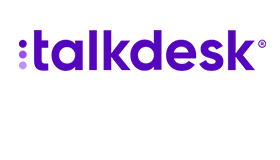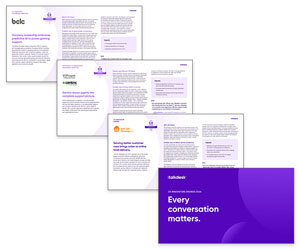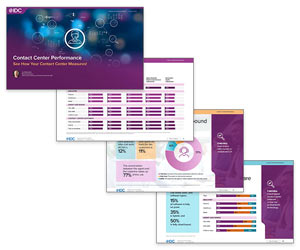We’ve all been there. We email a company, and wait for a response, but it never comes. So, we pick up the phone and call, only to realize that the agent on the other end has no idea about our previous email. Frustrating, isn’t it?
This is a classic example of a disjointed customer experience, leading to multiple customer interactions for a single issue. However, it could have been easily avoided with an omnichannel contact centre platform.
It provides a 360-degree view of the customer, equipping agents with the knowledge they need to resolve the customer’s issue in the first interaction.
Not only does this minimize the effort required by the customer, but it also reduces the time agents spend handling each interaction.
What does achieving high first contact resolution (FCR) rates mean, and why is it beneficial?
The Benefits of Achieving High First Contact Resolution Rates
Achieving high FCR rates is not just a key performance indicator for contact centres, it also benefits both customers and employees.
Reduces Customer Effort and Improves Satisfaction
One of the main advantages of high FCR is the reduction in customer effort. When a customer’s query is resolved on the first contact, it eliminates the need to follow up or repeat their issue multiple times.
This significantly reduces the effort they need to put in to solve their problem, leading to a more seamless and satisfying customer experience.
Additionally, it fosters a sense of trust and loyalty towards the company that results in improved customer satisfaction, higher customer retention rates, and positive word-of-mouth referrals.
Improves Employee Satisfaction
High FCR rates also have a positive impact on employee satisfaction. Resolving a customer’s inquiry on the first contact improves customer satisfaction.
This tangible influence can boost their morale, increase their job satisfaction, and foster a sense of accomplishment.
As a result, they are likely to be more engaged and loyal to the organization, leading to lower turnover rates and a more positive work environment.
Reduces Contact Centre Costs
From an operational perspective, high FCR rates can lead to significant cost savings. Queries resolved on the first contact trim customer support expenses.
Efficient resolution of customer inquiries means a lower number of interactions and less strain on resources, eliminating the need for hiring additional agents. This results in further cost savings and allows for a more strategic allocation of resources.
Achieving high FCR rates enhances customer and employee satisfaction and brings significant financial benefits. It’s a win-win situation for all stakeholders involved.
How to Achieve High First Contact Resolution Rates in Contact Centres
High FCR rates are a goal for any customer service team. But how do you get there?
1. Understand the Root Causes of Low First Contact Resolution Rates
Start by understanding why issues are not resolved on the first contact. Identifying these common problems allows the development of targeted strategies to increase FCR.
Use customer experience analytics tools to provide valuable insights into these interactions. They analyze call recordings, chat transcripts, and data from various channels to offer in-depth analytics, making it easier to pinpoint areas for improvement.
2. Invest in AI Quality Management Tools
Supervisors play a crucial role in ensuring high rates. However, without complete visibility into agent–customer interactions, they may struggle to identify and address issues that lead to low rates.
An AI-powered quality management tool can provide this much-needed visibility. These tools automatically score customer–agent interactions, highlighting areas where agents might need additional training or support.
This allows supervisors to provide targeted feedback and coaching, enhancing agents’ skills.
3. Power Up Your Knowledge Base System With AI
A well-structured knowledge base is a powerful tool for increasing FCR. However, traditional systems can be time-consuming for agents to navigate, leading to longer resolution times and lower rates.
An AI-powered knowledge base management system addresses this issue, providing recommended responses based on the customer’s query.
This allows agents to find the right answer quickly, reducing the time spent on each ticket and increasing the chances of resolving the issue on the first contact.
4. Provide Customers With AI Chatbots and Self-Service Options
Today’s customers expect quick and efficient service. AI chatbots can help meet these expectations by handling simple inquiries, freeing up agents to focus on more complex issues.
This not only reduces the average handling time but also increases rates. In addition, providing self-service options empowers customers to find solutions at their convenience, further improving the customer experience.
For instance, a robust FAQ section or a user-friendly customer portal can enable customers to resolve common issues without needing to contact an agent.
5. Streamline Internal Processes
Empowering agents to resolve issues on their own can significantly increase FCR. This requires streamlining internal processes and allowing agents to handle common customer requests.
For example, authorizing an agent to independently remove late fees, solve warranty issues, remove shipping charges, issue refunds, returns or credits, or adjust billing cycles.
Giving your agents greater autonomy to handle customer requests eliminates the need for manager intervention and speeds up the resolution process.
This improves rates and increases agent satisfaction as they feel more empowered and capable in their role.
6. Route Customers to the Best Agent to Resolve Their Query
One of the keys to achieving high FCR rates is connecting customers with the agent best equipped to resolve their issues.
For instance, some agents may be more experienced in handling billing issues, while others might excel at troubleshooting technical problems.
Categorizing agents based on their expertise and using skills-based routing tools means you can ensure that callers reach the right agent.
This not only speeds up resolution time but also enhances customer satisfaction. A prime example of this strategy in action is the routing feature that efficiently directs callers to the right agent.
7. Invest in Omnichannel Solutions
Remember the scenario described in the introduction where the email went unanswered, leading to a frustrating phone call? This situation could have been avoided with an omnichannel engagement solution. These solutions ensure that all customer interactions across different platforms, such as social media, email, or phone are tracked and addressed. This way, if a customer contacts your company through various channels, your team will have a record of all those interactions.
This comprehensive view of the customer’s journey enables your agents to provide seamless, efficient service improving the FCR rate. The Talkdesk omnichannel engagement solution is an excellent example of a system designed to provide this level of integrated FCR customer service.
Tips to Help Improve First Contact Resolution Rates
Improving FCR is a multifaceted process. It involves understanding the root causes of low FCR, investing in AI quality management tools, and enhancing your knowledge base system with AI.
Other effective strategies are providing customers with AI chatbots and self-service options, streamlining internal processes, routing customers to the best-suited agent, and investing in omnichannel solutions.
Each of these tactics is crucial in increasing FCR, improving customer satisfaction, reducing operational costs, and enhancing employee morale.
The impact of these strategies can be seen in real-world scenarios. Xenial, a customer-centric company was struggling with disjointed customer experiences and low FCR. After implementing the Talkdesk cloud contact center platform, Xenial saw a significant improvement in FCR.
The advanced features, including AI-powered knowledge base and omnichannel engagement solution, helped them provide seamless, efficient customer service.
Improving FCR is not a one-time task but a continuous process that requires a strategic approach, the right tools, and a customer-centric mindset.
Implementing these best practices can help companies enhance customer service, foster customer loyalty, and achieve significant cost savings.
FAQs
What Is First Contact Resolution?
FCR is a crucial metric in customer service that measures the percentage of customer issues resolved during the first interaction.
It reflects the ability of a company to address and resolve customer queries or complaints without the need for follow-up interactions.
Why Is First Contact Resolution Important for Customer Service?
FCR is essential for customer service as it directly impacts customer satisfaction. A high FCR rate signifies efficient service delivery where customer issues are promptly addressed and resolved, enhancing customer satisfaction and loyalty.
A strong focus on FCR improves customer satisfaction and reduces operational costs, minimizing the need for customers to make repeat contacts for the same issue and streamlining overall service efficiency.
How Is First Contact Resolution Measured?
FCR is typically measured by dividing the number of tickets resolved on the first contact by the total number of tickets.
This figure is then multiplied by 100 to get the FCR percentage. Surveys and direct customer feedback can also be used to measure FCR.
What Is a Good First Contact Resolution Rate?
A good FCR rate can vary depending on the industry, the complexity of the issues handled, and the specific goals of a company.
However, as a general benchmark, an FCR rate of around 70-75% is often considered good. This means that 70-75% of customer issues are resolved during the first interaction with the customer service.
While this is a general guideline, each organization may have different standards based on its unique business needs.
This blog post has been re-published by kind permission of Talkdesk – View the Original Article
For more information about Talkdesk - visit the Talkdesk Website
Call Centre Helper is not responsible for the content of these guest blog posts. The opinions expressed in this article are those of the author, and do not necessarily reflect those of Call Centre Helper.
Author: Talkdesk
Published On: 19th Feb 2024 - Last modified: 6th Dec 2024
Read more about - Guest Blogs, Talkdesk






 Talkdesk is a global customer experience leader for customer-obsessed companies. Our contact center solution provides a better way for businesses and customers to engage with one another.
Talkdesk is a global customer experience leader for customer-obsessed companies. Our contact center solution provides a better way for businesses and customers to engage with one another. 












